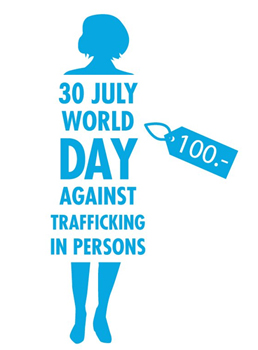
 2018-07-30
2018-07-30
Human Trafficking: gaps in legislations opens the door for violations to continue occuring locally
Amman- It has become universally recognized that the fight against the crime of human trafficking is a major and important challenge for all countries around the world. In order to highlight this fight, The United Nation General Assembly decided in 2013 to declare the 30th of July as the World Day Against Trafficking in Persons as a reminder of the dangers of this crime and that it is not limited to neither time nor place.
Trafficking in Persons is a global phenomenon that is now commonly considered as a form of contemporary slavery. Estimates in 2012 indicate that this crime affects 27 million people worldwide, whether men, women or children. Other human rights violations that include detention, physical abuse, or confiscation of documents could be used as means of exploitation to the degree of Forced Labour or Sexual Exploitation. Every country in the world is affected by the phenomenon of human trafficking, whether that country is of origin, transit or destination of the victims.
Even though Jordan has many international obligations that resulted in the issuance of a national law on Anti- Human Trafficking in 2009, the implementation of these laws is still far from being compatible with international standards.
In terms of the law itself, the definition of the crime that was adopted by the national law is the same one that is stipulated in the International Protocol to Prevent, Suppress and Punish Trafficking in Persons, Especially Women and Children. While the international definition covers all the aspects of the crime, the problem with its adoption nationally is that there are concepts mentioned in the law that do not exist within its national counterpart, which makes the law difficult to apply.
Further issues include the conflicts that exist between the different laws and the gaps in others exuberates the difficulties in identifying potential victims and result in placing them in more vulnerable situations that eventually could lead for them to be exploited.
In this context, Tamkeen Fields for Aid has been actively contributing to the fight against trafficking in persons, and assisting the victims, whether legally or by providing them with protection, especially the women. Through the years, it has also conducted several awareness sessions, and trainings to workers on this issue, as well as providing them with consultations and legal aid when needed, in cooperation with the competent authorities.
Based on the above, Tamkeen would like to highlight the following issues that are related to Human Trafficking that the centre has noted during its work:
1. The US State Department's Trafficking in Persons Report 2018 classified Jordan as a Tier 2 in relation to its efforts of combatting human trafficking. The report considers Jordan a country of destination and transit for adults and children victims of trafficking who are usually exploited in Forced Labour or in Sex Trades, though to a much lesser extent. Another problem highlighted by the report relates to the Sponsorship (Kafala) System that is still implemented which prevents migrant workers from transferring to another employer, as well as from the possibility of using legal methods or the authorities when they are subjected to exploitation. The evaluation and recommendations listed in the report are in fact compatible with the Centre’s own that it has reached through its work on Human Trafficking in Jordan. Thus, Tamkeen repeats its demands to redefine the crime of human trafficking in a precise and clear manner and in accordance with the Jordanian legislative environment. Also, the definition needs to be compatible with existing laws including the Penal Code and the Anti- Human Trafficking law, as some of the acts mentioned in the act constitute separate offenses under the Penal Code, such as kidnapping, fraud and forcing women to engage in prostitution. Such conflicts have led to cases to be put on trial using other laws.
2. The Centre has frequently asked in the various meetings it held with competent authorities, in the workshops it organised and in its studies for a definition to be included for the crime of Forced Labour and the enactment of appropriate legislations on one hand and the implementation of appropriate administrative measures that will help to eliminate this practice and punish its perpetrators. Also, both the Sponsorship System and the falsified complaints need to be abolished as they help entrench Forced Labour on the ground, as well as violate the basic human rights of workers.
3. Despite the opening of a specialized shelter for victims of trafficking in 2015, there are in fact problems related to the shelter. These issues include the shelter almost exclusivity offering spaces for female victims while limited space are only available for male victims. Also, victims are only allowed to stay for a short period of time that does not exceed 3 months, which is insufficient for their case to be duly processed and the judgement to be issued due to the longevity of the legal process in Jordan; or for compensations to be issued for the victims. The policy of the shelter also only victims of trafficking as confirmed by the Anti- Human Trafficking Unit are allowed entry to the shelter, constituting a big problem as many suspected victims are sent to prisons instead of the shelter in light of this policy.
4. The Centre calls for legislation that provides the worker / victim the right to obtain legal residence or work permit while the trafficking case is considered at court, as the current legislations that are enacted result in many workers being either detained or deported despite having a case under review.
5. Through the complaints received by Tamkeen of potential trafficking victims, there were cases that were solved through reconciliation between the worker and employers. Despite the worker the fact that the worker is entitled to many rights in view of the length of her work and the number of hours she worked for, she tends to accept these reconciliations in return for receiving the salaries that she was denied and being able to continue working with another employer or even continuing with the same employer in return for a verbal commitment to pay her salaries on time.
6. Tamkeen demands that special prosecutors are assigned specifically for human trafficking cases as this would contribute to a speedier litigation process. It will also lrad to the increase in the number of cases that are adapted as cases of human trafficking rather than cases of labour violations, as adapting it as such usually result in lesser sentences for traffickers which are incompatible with the dangerous nature of the crime committed nor deterrent enough for future perpetrators.
7. Tamkeen has participated in various activities that aimed at introducing amendments to the current Anti- Human Trafficking law. It also joined similar activities that offered contributions on how to further develop and amend the current National Strategy to Combat Human Trafficking. These amendments were all the result of the work Tamkeen has done as parts of its goal to combat this crime. Furthermore, they were in accordance with the cases numerous cases it received and worked on; and with the goal of helping to combat the crime, help the victims, and punish the traffickers.
8. In the first half of 2018, Tamkeen has referred 28 potential trafficking cases to the Anti- Human Trafficking Unit.
9. The referred cases were about migrant workers who were potential human trafficking due to the violations that they were subjected to. Thee violations include: the restriction of freedom, confiscation of passports, non-payment of wages, deprivation of food, prevention from communication with their family, as well as verbal and physical abuse. Other forms of violations include: lack of health care or a private place to sleep, long working hours, deprivation of leaves, working in more than place and some cases of sexual harassment.
Therefore, Tamkeen asks that the observations, amendments and recommendations that were previously and are still made till today be noted as we continue our work to fight against this dangerous crime.

